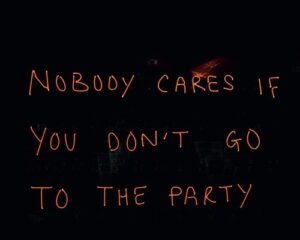“Nobody likes you. Everybody hates you. You’re gonna lose. Smile, you fuck.” Joe Hallenbeck, The Last Boy Scout.
Let me get this out of the way. When lists are short, I am good. I am horrible at almost everything. I have to say “almost” because I am sure there is something I am good at, but I do not know what for the life of me.
So here are things I suck at that I can say with conviction:
- Being attractive
- Being normal
- Being likable
- Being social
- Math
I know it seems like I loathe myself, but I keep pushing to do what feels like the right thing. The problem with such a list is that I had to learn each. Now, I knew about the math thing. I never liked math; frankly, math was never crazy about me. Poor Mister Dubin. He was my eleventh-grade trigonometry teacher. I could not figure out how he intersected triangle PAM or what the sine, cosine, or tangent of triangle KAT could ever be.
I asked him why he gave me a passing grade on the last day of school. His answer was simple. “I do not want you back again next year plus, and this is big. You kept showing up, and you came for extra help. You were a deer in the headlights, but I admired your determination. Just because you came to seek me out on the last day to ensure it wasn’t a typo on your report card shows you care. Go have a wonderful summer and keep pushing yourself.”
So, how great was it when my father decided I should be a textile engineer? “It’s the family business. You’ll do well.”
I didn’t know it then, but this was strike one for me. The family business? Does that mean it’s in my DNA because if it was, I could not find it. Two of my cousins were already in the business. They struck out at everything they did, so they were banished there. Did I mention that neither went to school to be a textile engineer? I wanted to be a writer. It was about the only thing I did not suck at.
How great was that day in Chem Lab 101 when I had to light a fire under my Bunsen burner? You had to answer the ten equations on the board to light it properly. Every student answered the questions within seconds and had beautiful shades of blue and orange flames. I, on the other hand, had a flame that was a hideous shade of green. The Teacher’s Aide came by my table and informed me, “The science community has no room for someone with your skill-set,” before showing me the F I earned.
Let’s keep this shit show moving, shall we?
After three months on a job paying $18,500 a year, my father drove me into the city on a wintry Sunday morning to look for an apartment. He did his happy dance when he found the postage-sized rental in midtown Manhattan and negotiated the price down to a paltry monthly sum of $850.
“You told me they like you at this job. You’ll be making money in no time.”
You got it. That was strike two.
The next nine years might have been the best time of my life. I learned how to sell, how to be a professional, and most importantly, how to drink all night, shower, shave, and work the next day. I remain friends with several people from that job, two of whom I speak with regularly. 
I failed to mention that I fell in love with someone at that job, but I always thought I was punching above my weight when we were together. I don’t believe she felt that way, but after being friends for ten years, I said I wanted more, and she agreed.
It took all of two dates to know I wanted to spend the rest of my life with her. She was the best person I knew. I valued her and wanted to develop a lasting emotional connection. Upon purchasing an engagement ring, I called my friend Rob, who told me he had an idea for a proposal and a freshly rolled joint. “Be there in a few minutes,” I said.
I detoured and stopped at my parent’s house. I was excited and wanted to tell them their number three and last child was getting married.
I did not receive the expected response and subsequently did not marry the woman I was/remain in love with. My dad informed me she was too good for me and told my mother to find me their idea of the perfect wife. Read my previous posts to learn about my life with The Narc.
Strike three! You are out of there!
I get it. I do. Why, in God’s name, did you not decide for yourself? Come back to me on that one. My only conclusion is that my parents completely controlled me, and I must have liked it. It made life easier. I never had to decide for myself. Besides, whenever I made a decision, they nixed it. At least the big ones, college, where to live, who to marry. All three turned out to be nightmares.
My mother passed away last year, and my father died nine days after my first son was born. For what it’s worth, Alex just turned 21. The Narc died a few years ago, but it was after our divorce. I say that because throughout our separation and once the papers were signed, she yelled from every rooftop about how awful I was. She ignored the co-parenting agreement. She told her family and our sons how she had full custody. She ignored the judge’s warning to keep our then-teenage boys from me, but she played the clock. She continued the lies on her deathbed, explaining that I refused to pay child support, which has been paid in full but kept secret. Her family has strong-armed me out of both of my sons’ lives. They have told people it is their way of honoring her.
Can’t he do anything?
So, my whole life comes down to my parents’ horrible choices? How about the fact that they never let me decide anything for myself?
Hang on. Just hang on. So, poor me. My life to this point is a nightmare because of my parents?
Well, yes. But here’s the thing. I have been around long enough to know that playing the blame game is pointless. Women dig guys who condemn their shortcomings to their parents. I own it. I totally own it. I know I could have stopped them or walked away at any point, but I did not. So I own it. Whoever I have become, it is because of me.
Okay, that said, one of the biggest dangers of carrying chronic anger toward a parent lies not simply in what it does to our parents and us, but how it might affect our relationship with an intimate partner or our children. Well, I have the answer to that one. The Narc never loved me, so there was no chance of intimacy, and she made sure my sons, now young men, wanted nothing to do with me upon filing for divorce, despite a co-parenting agreement.
How to move from anger to understanding, or how I did it.
We can’t forgive our parents until we know we didn’t deserve their mistreatment. It is equally important to realize that traumas often beget traumas in the world of the family. Most parents who mistreat their children are likely also mistreated. To break this sad cycle, a goal might be to see one’s parents not only neglectful or hostile but also ill-equipped to create a family environment that fosters confidence and secure attachments.
The notion that parents “did the best they could” may seem negating for those who already feel impoverished and undeserving. But moving toward that perspective, rather than holding on to long-term or newly found anger, has three potentially productive outcomes:
- First, some adults can successfully establish a more satisfying relationship with their parents, in-laws, or extended family members rather than removing themselves from any relationships with their extended family.
- Second, for some adults, this stance can set reasonable limits for a relationship with a parent who continues to be abusive instead of continuing to carry ongoing feelings of anger that infect other aspects of life.
- Third, gaining a more differentiated view of why parents behaved as they did can help us avoid the cycle of insecure attachments with our partners and children. This may foster the possibility of our parents and children developing a relationship across the generations as we form new families, thus offering our children relationships in their extended family.
It takes psychological effort to go from anger to understanding, and nurturing the insight that feels intentional isn’t always so. This is true whether one is receiving help from a professional.
It also demands developing more immunity to a parent’s perceptions and behaviors. This process signifies growth and makes us more resilient in family relationships and in confronting life’s challenges. Developing compassion for parents, intimate partners, and friends are helpful, not only because it makes us more compassionate people, but because it allows us to see others’ frailties, to recognize sometimes bungled attempts to care for us, and eventually to love more fully and be more open to being loved by others.
While many people (by many people, I mean me) find that this is one of the most challenging tasks to accomplish—with or without professional help—some are lucky enough to discover that it is freeing in ways they hadn’t imagined and that the world seems a more welcoming place in which to live and love.
Sometimes I am terrible to myself, and I relentlessly compare myself to others, no matter how many times I read or hear about how good or lovable I am.
Almost daily, I meticulously look for evidence that I am a nobody, that I don’t deserve to be loved, or that I’m not living up to my full potential.
There is a lot of pressure to “stack up” in our culture. We feel as if there is something wrong with us if, for example, we’re still single by a certain age, don’t make a certain amount of money, don’t have a large social circle, or don’t look and act a certain way in the presence of others. The list could honestly go on forever.
Sometimes during all the pressure, I forget all the unique things about myself.
I get stuck in my head and allow my inner voices to tear apart my self-esteem until I hate myself too much to do anything except eat a quart of strawberry ice cream, watch Law and Order breaking only to watch Blue Bloods all day, and sleep.
On a side note, The Narc would not allow me to watch Law and Order. She would tell me I was once again being selfish because “watching violent police shows before bed gives me nightmares.”
And now for the contradiction.
The other day, while I was beating myself up over something I can’t recall, I read a comment from someone who read one of my essays, telling me that one of my posts got them through the night. Literally, and if that simple word was used in the intended context, this person told me one of my posts saved their life.
I get comments like these now and again, and they always open my eyes to how much I matter, regardless of my inner critic’s vehement objections. But to be clear, The Narc’s words, locked in the attic, drown out those kind words.
What words? You always make everything about you. You always think you’re a victim. All you do is lie, and you lie, and you lie. What don’t you get about nobody liking you? Oh, and your mother is a bitch.

Her dialogue ended with the phrase, “And your mother is a bitch.” Since we completed the divorce, I have looked heavily into that one phrase. My older son, four years ago, the last time he or my younger one spoke with me (The Narc had them block my number, and they do not return my texts), informed me he “hated Grandma.”
That stung. It hurt, but not as much as it would over time. My mother was genuinely terrific at being a grandma. She and my dad had a calling for this because they were much better at being grandparents than they were at parenting. But, to say, “I hate Grandma,” proved that he was outwardly growing but inwardly stuck at ten years old and listening to his mother. My mother was grand to him, his brother, her six other grandchildren, and multiple great-grandchildren. Two people in the world disliked my mother. Two. The first was the guy who married her sister, a nasty guy. The other was my wife, a nasty and evil woman. Shocking how my boys dislike me.
Back to those lovely words. Such comments also open my eyes to all the things we beat ourselves up over that don’t matter—like how I look on the beach or if I should stop smiling because I’m not whitening my teeth, or whether the hole in my sneakers means it’s time to get a new pair.
Lately, I’ve been trying harder to catch myself when I feel a non-serving, self-deprecating thought coming. And I may let these thoughts slip, but that’s okay because I’m only human. The clash occurs, but I must get past the voices to live.
While my self-love journey is ongoing, here are a few things I try to remember when I’m tempted to be mean to myself:
The people you compare yourself to compare themselves to other people, too.
We all compare ourselves to others and the people who seem to have it all do not.
When you look at other people through a lens of compassion and understanding rather than judgment and jealousy, you can better see them for what they are—human beings. They are beautifully imperfect human beings going through the same universal challenges that we all go through.
Your mind can be a very convincing liar.
I saw a quote once that read, “Don’t believe everything you think.” That quote completely altered how I react when a cruel or discouraging thought goes through my mind. Thoughts are thoughts, and giving so much power to the negative ones is unhealthy and exhausting.
There is more right with you than wrong with you.
This powerful reminder is inspired by one of my favorite quotes from Jon Kabat-Zinn, the creator of the Stress Reduction Clinic and the Center for Mindfulness in Medicine, Health Care, and Society at the University of Massachusetts Medical School: “Until you stop breathing, there’s more right with you than wrong with you.”
As someone who sometimes tends to zoom in on all my perceived flaws, it helps to remember that I like many things about myself, too—that I’m alive and breathing and able to pave new paths whenever I choose. And as I am reminded regularly, I am narc-free.
You need love the most when you feel you deserve it the least.
This was a recent epiphany, although it’s been said many times.
I find it most difficult to accept love and understanding from others when I’m in a state of anger, shame, anxiety, or depression. But adopting the above truth shifted my perspective and made me realize that love is the greatest gift I can receive during such times.
You must fully accept and make peace with the “now” before reaching and feeling satisfied with the “later.”
Yeah, this is big. One thing I’ve learned about making changes and reaching for the next rung on the ladder is that you cannot feel delighted with where you’re going until you can accept, acknowledge, and appreciate where you are.
Embrace and make peace with where you are; your journey toward something new will feel much more peaceful, rewarding, and satisfying. (Pretty deep, huh?)
Focus on progress rather than perfection and on how far you’ve come rather than how far you have left to go.
One of the biggest causes of self-loathing is the hell-bent need to “get it right.” We strive for perfection and success, and when we fall short, we feel less than and worthless. We don’t realize that working toward our goals and being willing to put ourselves out there are accomplishments within themselves, regardless of how often we fail.
Instead of berating yourself for screwing up and stumbling backward, pat yourself on the back for trying, making progress, and coming as far as you have. (Again, this is easier said than done).
You can’t hate your way into loving yourself.
Telling yourself what a failure you are won’t make you any more successful. Telling yourself, you’re not living up to your full potential won’t help you reach a higher potential. Telling yourself you’re worthless and unlovable won’t make you feel any more worthy or lovable.
I know it sounds almost annoyingly simple, but the only way to achieve self-love is to love yourself—regardless of who you are and where you stand, even if you know you want to change.
You are enough just as you are. And self-love will be a little bit easier every time you remind yourself of that.
Isn’t that all great? So I know what needs to be done. I know how to repair it. Did you hear the expression, “Do not take your foot off the gas?”
In other words, I must remember daily that I am worthy of being alive and no worse than anyone else. I must think that otherwise, I go back to a tremendous depression.
I hate myself. I think I have always hated myself. I was not good enough as a kid. I was almost invisible in school. And just when I began accepting myself for who I was (a simple yet complex guy who enjoyed time with his family), a narcissist came into my life hellbent on destroying me and, like a leech, continued sucking the life out of me.
“Narcissists take everything so personally because underneath their grandiose bravado lurks profound self-loathing—they need to be shored up by constant external praise.”
So, this is what happens. I would talk about an issue, and she related it immediately to something that happened to her; my story faded as hers took over. Or we’d disagree, and somehow, I second-guessed myself as if dissent threatened her well-being. Any needs I communicated that weren’t in line with hers were thrown back at me as character flaws. For instance, I tell her I can’t get together on our usual date night because of work, and her comeback is: “Because you always make everything about you. Everything’s always about you. I’m sure the job can wait. You’re just going out with people from work.” Suddenly you have a global problem, and she is a victim. What a head trip. So, when I change everything to accommodate her, she opens the door with a flat face and says, “I thought you had to work late.” I respond with a bit of a dig, “You wanted me to change it, so I did.” And the response is always the same. “I didn’t tell you to change anything. You said you couldn’t make it. Don’t blame me.”
And there you have, the Narc. And it’s all because you mean nothing, and they MUST control you.
The big, charming personality is typical of narcissists. Initially quite likable, they capture everyone’s attention. It is easy to fall hard when they shine their light on you.
But that fall becomes painful when other narcissistic traits make themselves known. Narcissists are hypersensitive to any perceived critique. Feedback other than flattery feels like a slight and can trigger extreme anger. They feel deeply injured by criticism and excessively need praise and admiration. Any time you express your honest feelings, you might stumble into your partner’s emotional quicksand. This is not what real love feels like.
Falling in love may put you off balance, but standing in love firmly grounds you. An essential ingredient of a good relationship is emotional safety—you must feel safe to be the real you! But it is exceedingly difficult to be yourself when you have such an emotionally volatile partner. Narcissists are often arrogant, self-important, and devoid of empathy. They are so in their world that they can’t even see you. It’s hard to stand in someone else’s shoes when you can’t see past your own. Narcissists see you not as you but more as an extension of themselves.
The highest form of romance is to be seen and adored for who you are. I once heard that intimacy can be broken down into the words “IN TO ME YOU SEE.” It is difficult for the narcissists in your life to truly see you and get you because they are focused on themselves. Their needs steamroll over yours. Talking about your feelings becomes exhausting and frustrating because they can’t truly appreciate your perspective, and you have to sugarcoat everything to avoid setting them off.
Recovering from the effects of narcissistic or emotional abuse can be challenging. But it is possible to heal.
How?
Learn a bit about narcissism. That will help you stop wondering about what you have lost. You have lost nothing but pain and confusion, but you don’t know that until you know about narcissism. Your narc will have done such a number on you that you think you will never find such passionate love again. But here’s the thing…there was nothing special about that relationship. The Narc and you did not share a special bond; no fate, destiny, or soulmates were involved- it was all just a narc con. The Narc never loved you. You would only get sucked further into Narc-world and manipulated until your head spun. The more you read significant articles from survivors, the quicker you realize the pattern, and you will see how closely your narc followed it- because it works.
But escape is possible and is the only way to achieve happiness. You will be horrified when you read about how The Narc betrayed you- but no matter, at least now you have a good shot at peace and happiness. Just wait till you find real love after this experience; you will be astonished. There is no such thing as a successful relationship with a narc, and no such thing as a happy ending with one- all are doomed to failure, either by you getting fed up and walking away, The Narc ditching you, or you being fully controlled, and no more than The Narc’s servant.
As for me, well, I’m another day closer to reaching out to Pam, cause you know, I am confident she is just sitting at home awaiting my call.


Pingback: The Power of a Woman | It Could Only Happen to Me